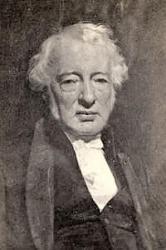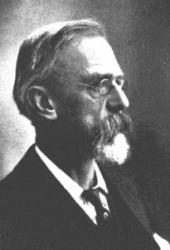Planning worship?
Check out our sister site, ZeteoSearch.org,
for 20+ additional resources related to your search.
- |
User Links
Person Results
Arthur Sullivan

1842 - 1900 Person Name: Arthur S. Sullivan Composer of "[Courage, brother, do not stumble]" in Songs of Service Arthur Seymour Sullivan (b Lambeth, London. England. 1842; d. Westminster, London, 1900) was born of an Italian mother and an Irish father who was an army bandmaster and a professor of music. Sullivan entered the Chapel Royal as a chorister in 1854. He was elected as the first Mendelssohn scholar in 1856, when he began his studies at the Royal Academy of Music in London. He also studied at the Leipzig Conservatory (1858-1861) and in 1866 was appointed professor of composition at the Royal Academy of Music. Early in his career Sullivan composed oratorios and music for some Shakespeare plays. However, he is best known for writing the music for lyrics by William S. Gilbert, which produced popular operettas such as H.M.S. Pinafore (1878), The Pirates of Penzance (1879), The Mikado (1884), and Yeomen of the Guard (1888). These operettas satirized the court and everyday life in Victorian times. Although he composed some anthems, in the area of church music Sullivan is best remembered for his hymn tunes, written between 1867 and 1874 and published in The Hymnary (1872) and Church Hymns (1874), both of which he edited. He contributed hymns to A Hymnal Chiefly from The Book of Praise (1867) and to the Presbyterian collection Psalms and Hymns for Divine Worship (1867). A complete collection of his hymns and arrangements was published posthumously as Hymn Tunes by Arthur Sullivan (1902). Sullivan steadfastly refused to grant permission to those who wished to make hymn tunes from the popular melodies in his operettas.
Bert Polman
Arthur Sullivan
Felix Mendelssohn-Bartholdy

1809 - 1847 Person Name: F. Mendelssohn Composer of "[Courage, brother, do not stumble]" in Union Hymnal, Songs and Prayers for Jewish Worship. 3rd ed. Revised and enlarged. Felix Mendelssohn-Bartholdy (b. Hamburg, Germany, 1809; d. Leipzig, Germany, 1847) was the son of banker Abraham Mendelssohn and the grandson of philosopher Moses Mendelssohn. His Jewish family became Christian and took the Bartholdy name (name of the estate of Mendelssohn's uncle) when baptized into the Lutheran church. The children all received an excellent musical education. Mendelssohn had his first public performance at the age of nine and by the age of sixteen had written several symphonies. Profoundly influenced by J. S. Bach's music, he conducted a performance of the St. Matthew Passion in 1829 (at age 20!) – the first performance since Bach's death, thus reintroducing Bach to the world. Mendelssohn organized the Domchor in Berlin and founded the Leipzig Conservatory of Music in 1843. Traveling widely, he not only became familiar with various styles of music but also became well known himself in countries other than Germany, especially in England. He left a rich treasury of music: organ and piano works, overtures and incidental music, oratorios (including St. Paul or Elijah and choral works, and symphonies. He harmonized a number of hymn tunes himself, but hymnbook editors also arranged some of his other tunes into hymn tunes.
Bert Polman
Felix Mendelssohn-Bartholdy
Norman MacLeod

1812 - 1872 Author of "Courage, Brother, Do Not Stumble" in Songs of Service Macleod, Norman, D.D., son of Dr. Norman Macleod, was born at Campbelton, Argyleshire, June 3, 1812. He studied at the Universities of Glasgow and Edinburgh, then went to Germany, and subsequently completed his course at the University of Glasgow, from which, in 1858, he received the degree of D.D. In 1838 he was appointed parish minister of Loudoun; Ayrshire, in 1843 of Dalkeith, and in 1851 of the Barony, Glasgow. He became one of the Queen's Chaplains in 1841, and in 1860 the editor of Good Words, which he continued to edit till his death. He was one of the most influential ministers in the Established Church of Scotland, and was Moderator of the General Assembly in 1869. He died at Glasgow, June 16, and was buried at Campsie, June 20, 1872. His works are numerous and popular. He was appointed a member of the Assembly's Hymnal Committee in 1854 and 1855. His best known hymn, "Trust in God, and do the right"(Right Doing), appeared in January 1857, in The Edinburgh Christian Magazine of which he was for some years the editor. [Rev. James Mearns, M.A.]
-- John Julian, Dictionary of Hymnology (1907)
========================
http://en.wikipedia.org/wiki/Norman_Macleod_(1812–1872)
Norman MacLeod
Philip Phillips

1834 - 1895 Composer of "[Courage, brother, do not stumble]" in Unfading Treasures Phillips, Philip, commonly known as the "Singing Pilgrim," was born in Chautauqua County, N. York, Aug. 13, 1834. Although engaged in farming for a time, from an early age he devoted himself to music, and ultimately devoted himself to the work of a "Singing Evangelist," in which capacity he has visited most English-speaking countries. His popular hymnals are: (1) Early Blossoms, 1860; (2) Musical Leaves, 1862; and (3) The Singing Pilgrim, 1866. In these works he published one or two hymns, including "I have heard of a Saviour's love" (The love of Christ), as in I. D. Sankey's Sacred Songs and Solos, 1878.
--John Julian, Dictionary of Hymnology, Appendix, Part II (1907)
Philip Phillips
Darius E. Jones
1815 - 1881 Composer of "[Courage, brother! do not stumble]" in Select Songs No. 2
Darius E. Jones
John Zundel
1815 - 1882 Composer of "BEECHER" in The Westminster Hymnal for congregational and social use and for the Sunday School John Zundel; b. 1815, near Stuttgart, Germany; organist in Brooklyn, N. Y., from 1847 to 1878; d. Cannstadt, Germany, 1882
Evangelical Lutheran Hymnal, 1908
John Zundel
P. P. Bilhorn

1865 - 1936 Person Name: P. Bilhorn Composer of "[Courage brother, do not stumble]" in Crowning Glory No. 1 Pseudonyms: W. Ferris Britcher, Irene Durfee; C. Ferris Holden, P. H. Roblin (a anagram of his name)
================
Peter Philip Bilhorn was born, in Mendota, IL. His father died in the Civil War 3 months before he was born. His early life was not easy. At age 8, he had to leave school to help support the family. At age 15, living in Chicago, he had a great singing voice and sang in German beer gardens there. At this time, he and his brother also formed the Eureka Wagon & Carriage Works in Chicago, IL. At 18 Peter became involved in gospel music, studying under George F. Root and George C. Stebbins. He traveled to the Dakotas and spent some time sharing the gospel with cowboys there. He traveled extensively with D. L. Moody, and was Billy Sunday's song leader on evangelistic endeavors. His evangelistic work took him into all the states of the Union, Great Britain, and other foreign countries. In London he conducted a 4000 voice choir in the Crystal Palace, and Queen Victoria invited him to sing in Buckinghm Palace. He wrote some 2000 gospel songs in his lifetime. He also invented a folding portable telescoping pump organ, weighing 16 lbs. It could be set up in about a minute. He used it at revivals in the late 19th century. He founded the Bilhorn Folding Organ Company in Chicago. IL, and his organ was so popular it was sold all over the world. He edited 10 hymnals and published 11 gospel songbooks. He died in Los Angeles, CA, in 1936.
John Perry
P. P. Bilhorn
Joseph Haydn

1732 - 1809 Person Name: Haydn Composer of "AUSTRIA" in Common Praise Franz Joseph Haydn (b. Rohrau, Austria, 1732; d. Vienna, Austria, 1809) Haydn's life was relatively uneventful, but his artistic legacy was truly astounding. He began his musical career as a choirboy in St. Stephen's Cathedral, Vienna, spent some years in that city making a precarious living as a music teacher and composer, and then served as music director for the Esterhazy family from 1761 to 1790. Haydn became a most productive and widely respected composer of symphonies, chamber music, and piano sonatas. In his retirement years he took two extended tours to England, which resulted in his "London" symphonies and (because of G. F. Handel's influence) in oratorios. Haydn's church music includes six great Masses and a few original hymn tunes. Hymnal editors have also arranged hymn tunes from various themes in Haydn's music.
Bert Polman
Joseph Haydn
William S. Bambridge

1842 - 1923 Person Name: W. S. Bambridge Composer of "ST. ASAPH" in The Church Hymnal
William S. Bambridge
John Bacchus Dykes

1823 - 1876 Person Name: J. B. Dykes Composer of "[Courage, brother! do not stumble]" in Songs of Victory As a young child John Bacchus Dykes (b. Kingston-upon-Hull' England, 1823; d. Ticehurst, Sussex, England, 1876) took violin and piano lessons. At the age of ten he became the organist of St. John's in Hull, where his grandfather was vicar. After receiving a classics degree from St. Catherine College, Cambridge, England, he was ordained in the Church of England in 1847. In 1849 he became the precentor and choir director at Durham Cathedral, where he introduced reforms in the choir by insisting on consistent attendance, increasing rehearsals, and initiating music festivals. He served the parish of St. Oswald in Durham from 1862 until the year of his death. To the chagrin of his bishop, Dykes favored the high church practices associated with the Oxford Movement (choir robes, incense, and the like). A number of his three hundred hymn tunes are still respected as durable examples of Victorian hymnody. Most of his tunes were first published in Chope's Congregational Hymn and Tune Book (1857) and in early editions of the famous British hymnal, Hymns Ancient and Modern.
Bert Polman
John Bacchus Dykes


 My Starred Hymns
My Starred Hymns

